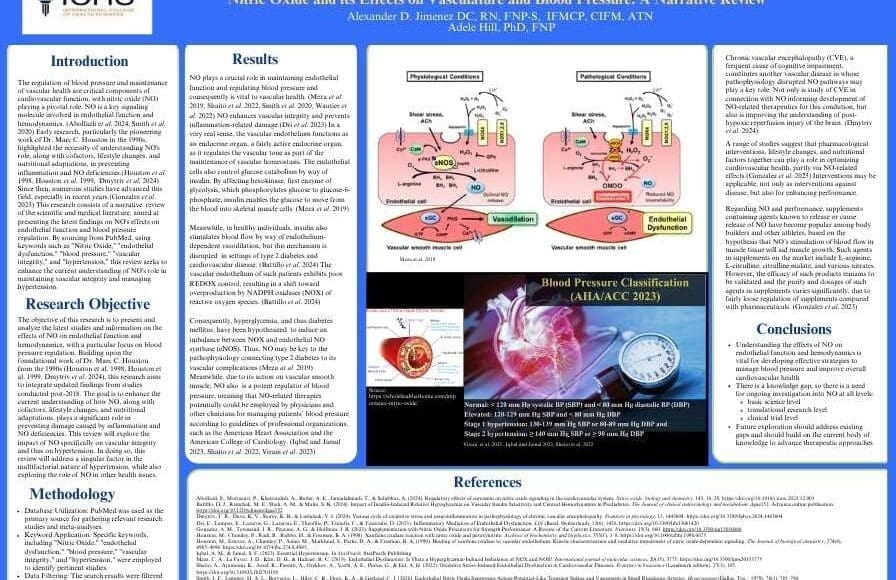Table of Contents
Introduction
The regulation of blood pressure and maintenance of vascular health are critical components of cardiovascular function, with nitric oxide (NO) playing a pivotal role. NO is a key signaling molecule involved in endothelial function and hemodynamics. (Abolfazli et al. 2024, Smith et al. 2020) Early research, particularly the pioneering work of Dr. Marc C. Houston in the 1990s, highlighted the necessity of understanding NO’s role, along with cofactors, lifestyle changes, and nutritional adaptations, in preventing inflammation and NO deficiencies.(Houston et al. 1998, Houston et al. 1999, Dmytriv et al. 2024) Since then, numerous studies have advanced this field, especially in recent years.(Gonzalez et al. 2023) This research consists of a narrative review of the scientific and medical literature to present the latest findings on NO’s effects on endothelial function and blood pressure regulation. By sourcing from PubMed, using keywords such as “Nitric Oxide,” “endothelial dysfunction,” “blood pressure,” “vascular integrity,” and “hypertension,” this review seeks to enhance the current understanding of NO’s role in maintaining vascular integrity and managing hypertension.
Research Objective
This research aims to present and analyze the latest studies and information on the effects of NO on endothelial function and hemodynamics, with a particular focus on blood pressure regulation. Building upon the foundational work of Dr. Marc C. Houston from the 1990s (Houston et al. 1998, Houston et al. 1999, Dmytriv et al. 2024), this research aims to integrate updated findings from studies conducted post-2018. The goal is to enhance the current understanding of how NO, cofactors, lifestyle changes, and nutritional adaptations significantly prevent damage caused by inflammation and NO deficiencies. This review will explore the impact of NO specifically on vascular integrity and, thus, on hypertension. In doing so, this review will address a singular factor in the multifactorial nature of hypertension while also exploring the role of NO in other health issues.
Methodology
Database Utilization: PubMed was the primary source for gathering relevant research studies and meta-analyses. Keyword Application: Specific keywords, including “Nitric Oxide,” “endothelial dysfunction,” “blood pressure,” “vascular integrity,” and “hypertension,” were employed to identify pertinent studies. Data Filtering: The search results were filtered to include studies conducted post-2018, thus ensuring the inclusion of the most recent and relevant findings.
Results
NO plays a crucial role in maintaining endothelial function and regulating blood pressure and, consequently, is vital to vascular health. (Meza et al. 2019, Shaito et al. 2022, Smith et al. 2020, Wautier et al. 2022) NO enhances vascular integrity and prevents inflammation-related damage. (Dri et al. 2023) The vascular endothelium functions as a fairly active endocrine organ, regulating the vascular tone to maintain vascular homeostasis. The endothelial cells also control glucose catabolism by way of insulin. By affecting hexokinase, the first enzyme of glycolysis, which phosphorylates glucose to glucose-6-phosphate, insulin enables the glucose to move from the blood into skeletal muscle cells. (Meza et al. 2019) Meanwhile, in healthy individuals, insulin also stimulates blood flow by way of endothelium-dependent vasodilation, but this mechanism is disrupted in settings of type 2 diabetes and cardiovascular disease. (Battillo et al. 2024) The vascular endothelium of such patients exhibits poor REDOX control, resulting in a shift toward overproduction by NADPH oxidases (NOX) of reactive oxygen species. (Battillo et al. 2024) Consequently, hyperglycemia, and thus diabetes mellitus, have been hypothesized to induce an imbalance between NOX and endothelial NO synthase (eNOS). Therefore, NO may be key to the pathophysiology connecting type 2 diabetes to its vascular complications (Meza at al. 2019). Meanwhile, due to its action on vascular smooth muscle, NO is also a potent regulator of blood pressure, meaning that NO-related therapies could potentially be employed by physicians and other clinicians for managing patients’ blood pressure according to guidelines of professional organizations, such as the American Heart Association and the American College of Cardiology. (Iqbal and Jamal 2023, Shaito et al. 2022, Virani et al. 2023)
Chronic vascular encephalopathy (CVE), a frequent cause of cognitive impairment, constitutes another vascular disease in whose pathophysiology disrupted NO pathways may play a key role. Not only is the study of CVE in connection with NO informing the development of NO-related therapeutics for this condition, but it also improves the understanding of post-hypoxic reperfusion injury of the brain. (Dmytriv et al. 2024) A range of studies suggest that pharmacological interventions, lifestyle changes, and nutritional factors together can play a role in optimizing cardiovascular health, partly via NO-related effects.(Gonzalez et al. 2023) Interventions may be applicable not only as interventions against disease but also for enhancing performance. Regarding NO and performance, supplements containing agents known to release or cause the release of NO have become popular among bodybuilders and other athletes, based on the hypothesis that NO’s stimulation of blood flow in muscle tissue will aid muscle growth. Such agents in supplements on the market include L-arginine, L-citrulline, citrulline malate, and various nitrates. However, the efficacy of such products remains to be validated, and the purity and dosages of such agents in supplements vary significantly due to the fairly loose regulation of supplements compared with pharmaceuticals. (Gonzalez et al. 2023)
Conclusion
Understanding the effects of NO on endothelial function and hemodynamics is vital for developing effective strategies to manage blood pressure and improve overall cardiovascular health There is a knowledge gap, so there is a need for ongoing investigation into NO at all levels: basic science-level translational research level clinical trial level Future exploration should address existing gaps and should build on the current body of knowledge to advance therapeutic approaches.

References
Abolfazli, S., Mortazavi, P., Kheirandish, A., Butler, A. E., Jamialahmadi, T., & Sahebkar, A. (2024). Regulatory effects of curcumin on nitric oxide signaling in the cardiovascular system. Nitric oxide: biology and chemistry, 143, 16–28. https://doi.org/10.1016/j.niox.2023.12.003
Battillo, D. J., Remchak, M. E., Shah, A. M., & Malin, S. K. (2024). Impact of Insulin-Induced Relative Hypoglycemia on Vascular Insulin Sensitivity and Central Hemodynamics in Prediabetes. The Journal of clinical endocrinology and metabolism, dgae152. Advance online publication. https://doi.org/10.1210/clinem/dgae152
Dmytriv, T. R., Duve, K. V., Storey, K. B., & Lushchak, V. I. (2024). Vicious cycle of oxidative stress and neuroinflammation in pathophysiology of chronic vascular encephalopathy. Frontiers in physiology, 15, 1443604. https://doi.org/10.3389/fphys.2024.1443604
Dri, E., Lampas, E., Lazaros, G., Lazarou, E., Theofilis, P., Tsioufis, C., & Tousoulis, D. (2023). Inflammatory Mediators of Endothelial Dysfunction. Life (Basel, Switzerland), 13(6), 1420. https://doi.org/10.3390/life13061420
Gonzalez, A. M., Townsend, J. R., Pinzone, A. G., & Hoffman, J. R. (2023). Supplementation with Nitric Oxide Precursors for Strength Performance: A Review of the Current Literature. Nutrients, 15(3), 660. https://doi.org/10.3390/nu15030660
Houston, M., Chumley, P., Radi, R., Rubbo, H., & Freeman, B. A. (1998). Xanthine oxidase reaction with nitric oxide and peroxynitrite. Archives of biochemistry and biophysics, 355(1), 1–8. https://doi.org/10.1006/abbi.1998.0675
Houston, M., Estevez, A., Chumley, P., Aslan, M., Marklund, S., Parks, D. A., & Freeman, B. A. (1999). Binding of xanthine oxidase to vascular endothelium. Kinetic characterization and oxidative impairment of nitric oxide-dependent signaling. The Journal of biological chemistry, 274(8), 4985–4994. https://doi.org/10.1074/jbc.274.8.4985
Iqbal, A. M., & Jamal, S. F. (2023). Essential Hypertension. In StatPearls. StatPearls Publishing. Meza, C. A., La Favor, J. D., Kim, D. H., & Hickner, R. C. (2019). Endothelial Dysfunction: Is There a Hyperglycemia-Induced Imbalance of NOX and NOS?. International journal of molecular sciences, 20(15), 3775. https://doi.org/10.3390/ijms20153775
Shaito, A., Aramouni, K., Assaf, R., Parenti, A., Orekhov, A., Yazbi, A. E., Pintus, G., & Eid, A. H. (2022). Oxidative Stress-Induced Endothelial Dysfunction in Cardiovascular Diseases. Frontiers in bioscience (Landmark edition), 27(3), 105. https://doi.org/10.31083/j.fbl2703105
Smith, J. F., Lemmey, H. A. L., Borysova, L., Hiley, C. R., Dora, K. A., & Garland, C. J. (2020). Endothelial Nitric Oxide Suppresses Action-Potential-Like Transient Spikes and Vasospasm in Small Resistance Arteries. Hypertension (Dallas, Tex. : 1979), 76(3), 785–794. https://doi.org/10.1161/HYPERTENSIONAHA.120.15491
Virani, S. S., Newby, L. K., Arnold, S. V., Bittner, V., Brewer, L. C., Demeter, S. H., Dixon, D. L., Fearon, W. F., Hess, B., Johnson, H. M., Kazi, D. S., Kolte, D., Kumbhani, D. J., LoFaso, J., Mahtta, D., Mark, D. B., Minissian, M., Navar, A. M., Patel, A. R., Piano, M. R., … Peer Review Committee Members (2023). 2023 AHA/ACC/ACCP/ASPC/NLA/PCNA
Guideline for the Management of Patients With Chronic Coronary Disease: A Report of the American Heart Association/American College of Cardiology Joint Committee on Clinical Practice Guidelines. Circulation, 148(9), e9–e119. https://doi.org/10.1161/CIR.0000000000001168
Wautier, J. L., & Wautier, M. P. (2022). Vascular Permeability in Diseases. International journal of molecular sciences, 23(7), 3645. https://doi.org/10.3390/ijms23073645
Post Disclaimer
Professional Scope of Practice *
The information on this blog site is not intended to replace a one-on-one relationship with a qualified healthcare professional or licensed physician and is not medical advice. We encourage you to make healthcare decisions based on your research and partnership with a qualified healthcare professional.
Blog Information & Scope Discussions
Welcome to El Paso's Premier Wellness and Injury Care Clinic & Wellness Blog, where Dr. Alex Jimenez, DC, FNP-C, a board-certified Family Practice Nurse Practitioner (FNP-BC) and Chiropractor (DC), presents insights on how our team is dedicated to holistic healing and personalized care. Our practice aligns with evidence-based treatment protocols inspired by integrative medicine principles, similar to those found on this site and our family practice-based chiromed.com site, focusing on restoring health naturally for patients of all ages.
Our areas of chiropractic practice include Wellness & Nutrition, Chronic Pain, Personal Injury, Auto Accident Care, Work Injuries, Back Injury, Low Back Pain, Neck Pain, Migraine Headaches, Sports Injuries, Severe Sciatica, Scoliosis, Complex Herniated Discs, Fibromyalgia, Chronic Pain, Complex Injuries, Stress Management, Functional Medicine Treatments, and in-scope care protocols.
Our information scope is limited to chiropractic, musculoskeletal, physical medicine, wellness, contributing etiological viscerosomatic disturbances within clinical presentations, associated somato-visceral reflex clinical dynamics, subluxation complexes, sensitive health issues, and functional medicine articles, topics, and discussions.
We provide and present clinical collaboration with specialists from various disciplines. Each specialist is governed by their professional scope of practice and their jurisdiction of licensure. We use functional health & wellness protocols to treat and support care for the injuries or disorders of the musculoskeletal system.
Our videos, posts, topics, subjects, and insights cover clinical matters and issues that relate to and directly or indirectly support our clinical scope of practice.*
Our office has made a reasonable effort to provide supportive citations and has identified relevant research studies that support our posts. We provide copies of supporting research studies available to regulatory boards and the public upon request.
We understand that we cover matters that require an additional explanation of how they may assist in a particular care plan or treatment protocol; therefore, to discuss the subject matter above further, please feel free to ask Dr. Alex Jimenez, DC, APRN, FNP-BC, or contact us at 915-850-0900.
We are here to help you and your family.
Blessings
Dr. Alex Jimenez DC, MSACP, APRN, FNP-BC*, CCST, IFMCP, CFMP, ATN
email: coach@elpasofunctionalmedicine.com
Licensed as a Doctor of Chiropractic (DC) in Texas & New Mexico*
Texas DC License # TX5807
New Mexico DC License # NM-DC2182
Licensed as a Registered Nurse (RN*) in Texas & Multistate
Texas RN License # 1191402
ANCC FNP-BC: Board Certified Nurse Practitioner*
Compact Status: Multi-State License: Authorized to Practice in 40 States*
Graduate with Honors: ICHS: MSN-FNP (Family Nurse Practitioner Program)
Degree Granted. Master's in Family Practice MSN Diploma (Cum Laude)
Dr. Alex Jimenez, DC, APRN, FNP-BC*, CFMP, IFMCP, ATN, CCST
My Digital Business Card


